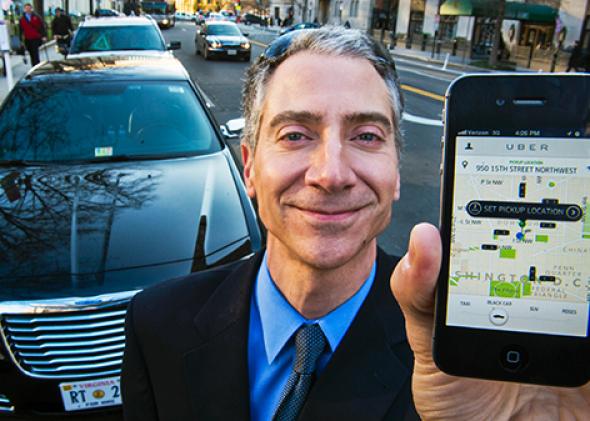Should Uber, the mobile app car-for-hire company, get to play by different rules than the rest of the taxicab industry? Taxi regulators in almost every major U.S. city have tried to impose rules on Uber that could drive it out of business. Fans of Uber, including Slate’s Matt Yglesias, contend that this is a mistake, because the company doesn’t need to be regulated beyond the driving laws that apply to every car on the road.
This is absurd; there are very good reasons to regulate hired vehicles. Giving my friend a ride somewhere in my car has different economic and social implications for a city than picking up a stranger and driving her someplace for a fee, Uber style. That said, Uber should be regulated differently than other taxi services, for a reason that may seem odd at first: The company collects a plethora of data that has never before existed in the cab industry. For the first time, Uber’s data can allow policymakers to directly measure taxi fares, the availability of cars, and the safety records of drivers without having to control every element of the market. If cities are smart, that could mean better oversight with less regulation.
Historically, it has been impossible to monitor what actually happened inside taxis because we didn’t have the technology to track the location of cars, the behavior of drivers, or the price of fares. And so, regulators have relied on meddlesome taxi commissions to control licensing, dispatching, and meter rates. The goal is to protect customers and ensure predictable taxi service, and heavy-handed regulation may help deal with some of these issues. But it’s also susceptible to manipulation; entrenched cab company owners can use the rules for their own advantage. For example, regulations that restrict new taxi firms from entering the market have driven up the price of medallions and owner profits.
Uber’s business model makes possible an entirely new approach. The company’s business model depends on technology that matches driver and passenger locations, controls payments electronically, and evaluates driver conscientiousness. The company has used its data to compute which city neighborhoods host the most casual sex and how the federal government shutdown impacted rides to and from the U.S. Capitol. It can certainly track data of more obvious use to public officials, such as pickup times in low-income neighborhoods and price surges. Uber can accurately and seamlessly measure safety, pricing, and equity of service—the goals at the heart of taxi regulation. This means that the company is right that it shouldn’t be subject to the chokehold of the taxi commissions.
But that doesn’t mean Uber shouldn’t be monitored altogether. Rather, commissions should observe the company’s actual performance in key areas like safety, pricing, and car availability. Uber’s data can help establish standards for hired cars that up to now have been impossible to determine. Old-fashioned taxi companies, with their archaic dispatching processes and lack of data, should still be subject to the old rules.
It is in Uber’s best interests to shape the parameters of these data analytics. Are accident records a better measure of safety performance than hospitalizations or customer complaints? How can the company provide a sample of pickup times and locations while protecting customers’ personal information? Answering these questions will require collaborating with local commissions on the use of verifiable, anonymous, and practical market data. In effect, Uber must introduce regulators to big data, an area in which the government has severely lagged behind.
Other tech-sector companies are moving in this direction already. PayPal, which is fighting its own battles with federal and state regulators, recently wrote a report on the role of big data in regulation. In a move that’s both savvy and self-serving, the paper suggests that regulators collaborate with the companies that they oversee.
Regulating companies like Uber and PayPal based on the new data they can produce won’t be easy. The costs of collecting and verifying good information can be high. The taxi commissions probably aren’t ready to crunch a lot of new numbers, and they will continue to squeeze Uber under the old rules until lawmakers or public pressure forces them to do otherwise. Finally, there is the matter of privacy. Customers may be willing to share their locations and weekend habits with Uber in exchange for good service but may balk at the prospect of a government agency trolling through their data, even if they are assured anonymity.
But it’s worth trying to surmount these obstacles. Uber has managed to revolutionize how the boring and outdated taxi industry operates on the streets. Now the company can help remake the rules, too.
